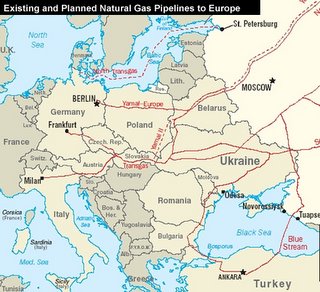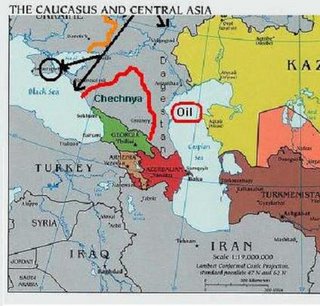
As I noted in the Russia-Iran Matrix: Ripples from Afghanistan to Iraq, Russia's energy market is the only thing that keeps its economy afloat, but it also recognizes the power that its energy resources have over former Soviet Republics. It's not adverse to using that power either in rather overt and heavy handed fashion.
From the Russia-Iran Matrix post, the EIA Analysis Russia:
In 2004, Russia’s real gross domestic product (GDP) grew by approximately 7.1%, surpassing average growth rates in all other G8 countries, and marking the country’s sixth consecutive year of economic expansion. Russia’s economic growth over the last five years has been fueled primarily by energy exports, particularly given the boom in Russian oil production and relatively high world oil prices during the period.
This type of growth has made the Russian economy dangerously dependent on oil and natural gas exports, and especially vulnerable to fluctuations in world oil prices.
Russia ostensibly cut off natural gas via it's nationalized natural gas company Gazprom because:
Gazprom had given Ukraine a deadline of midnight Saturday to agree to pay quadruple the amount it previously paid for Russian gas, which accounts for about a third of the consumption in the country of 48 million people.[snip]
On Saturday, Russian President Vladimir Putin said Ukraine could continue paying the old price of $50 per 1,000 cubic meters for the first quarter of 2006, but only if Ukraine agreed by the end of the day to start paying the new price of $230 in the second quarter.
In its own heavy handed fashion, the Ukrainian deputy head of government responded in December 2005:
 (black circle represents Sevastopol on the Crimean Peninsula)
(black circle represents Sevastopol on the Crimean Peninsula)Anatoliy Matviyenko, the deputy head of Ukraine's presidential administration, said yesterday that Ukraine may consider raising the lease for land the Russian fleet is using for its deployment at Sevastopol. He said that might be done if Russia insists on raising the rate Ukraine pays for Russian natural gas deliveries to market prices.
This immediately threatened Russia's ability to protect and keep open it's Black Sea access which is a major conduit for oil, natural gas and other imports and exports:
The bulk of Russia's oil is shipped to the Mediterranean and to Asia via tankers in the Black Sea, mostly from the port of Novorossiysk.
Novorossiysk is directly across from the Crimean Peninsula.
Because Russia continues to be paranoid about western influence in the former Eastern Bloc nations and its potential impact on Russia's sovreignty, economics and stability (see the problem here), it is still desperately trying to influence the political situation in its favor (again, rather ham handed and obvious):
The showdown has underlined the tensions between the two former Soviet republics since Ukrainian President Viktor Yushchenko — a West-leaning leader who wants to reduce Moscow's clout in his country — defeated a Russian-backed rival in a bitter electoral battle a year ago.
The gas crisis comes as Ukraine prepares for parliamentary elections in March, in which Yushchenko's bloc faces a strong challenge from the party of Viktor Yanukovych, who lost the presidential ballot after mass street protests forced a revote.
Russia continues to try to deny it and blame any repercussions for Europe on the Ukranians:
The Russian Foreign Ministry said Sunday that Ukrainian authorities "consciously decided to ruin the talks process with the Russian side and to use the gas problem almost to create the image of an enemy with the goal of manipulating the internal political situation."[snip]
A Foreign Ministry statement Sunday said Russia would "strictly fulfill" its supply commitments to Europe. It said the "responsibility for any possible ... problems for European countries caused by the actions of Kiev will lie with Ukraine."
They are also trying to drive a wedge between the Ukraine and Western European countries by insisting that the Ukraine is stealing gas, not just from Gazprom, but from the Europeans themselves:
But Aleksandr Medvedev, the director of the export arm of Gazprom, charged that Ukraine had siphoned millions of cubic meters of natural gas intended for export to Western Europe on the first day.
Speaking on Russian television, Mr. Medvedev took pains to assure Western European clients that their energy supplies were secure despite the company's dispute with Ukraine, while striving to lay any blame for a disruption on Ukraine.
"With the indisputable thievery of our gas from the export pipes, we've decided to take all possible measure to secure our gas so that Western consumers continue to receive gas in accordance with contracts," he said on state television.
Russia may have a valid complaint:
Ukraine's government has said its transit arrangements allow it to siphon off up to 15 percent of gas moving through the country. Russia says that would be outright theft.
However, the Ukrainians insist that it is legitimate based on existing agreements:
Ukraine's fuel and energy minister, Ivan Plachkov, denied the accusation that the country was siphoning gas for itself, a delicate issue for Ukraine, which is a signer of the European Energy Charter, a treaty that seeks to secure the flow of fuel across borders. "There has been no unauthorized diversion of natural gas," he said, according to the Interfax news agency.
Without details of the agreement between these two, the validity of either the complaint or the defense is in question. The "15%" that is "siphoned off" may indeed be part of the agreement which allows Russian gas to pass through the Ukraine in the first place (like a leasing agreement) or it may be that a guaranteed price was in place or that even the percentage "siphoned" or used by the Ukraine was expected to be less. Possibly, Russia was doing billing based on an estimate and through an audit or a disputed billing by one of its Western European nations that led to the discovery of over use and under payment by the Ukraine. The major issue is that the Ukraine sits on a security point for other Russian exports/imports. The Ukraine is relatively poor in energy resources as well as an economy based on agriculture and manufacturing. Russia quadrupling gas prices to the Ukraine, however much it reflects "market pricing", threatens Ukraine's survival and stability.
However, the real story is about the Ukraine no longer being influenced by Russia:
Most Western European countries supplied by Russia pay market rates, while countries formerly part of the Soviet sphere of influence pay varying subsidized rates, with deep discounts for some that remain close to Russia politically. The reduction in their energy supply especially threatens some of those countries, with their greater dependence on Russian energy and more fragile economies.
In fact, Russian gas may supply a large quantity of Ukrainian gas, but it's Turkmenistan that supplies the most:
Ukraine has been getting about a third of its natural gas from Russia. Gazprom made no promises on Monday to supply Ukraine's energy-intensive economy regularly in the months ahead. In fact, Gazprom said gas from the Central Asian nation of Turkmenistan, which provides more gas to Ukraine than Russia, was no longer reaching Ukraine's borders. The Central Asian gas passes through Russian pipelines.
Thus, the question of not paying market price does seem like a very bad cover for what is an actual attempt to directly influence Ukrainian politics, or, barring that, punishing the Ukraine for daring to go outside of Russia for support, economics and security guarantees.
In the meantime, the other problem with questions of energy resources, security, and stability became a problem for both nations:
Just hours after Russia disrupted gas supplies on Sunday morning by reducing pressure in the pipeline system, a cascading energy emergency moved westward across Europe, as one utility after another reported dropping gas pressures - at a time of peak demand in freezing weather.
As pressure continued to drop Monday, criticism erupted among European leaders, jittery over the threat to one of the Continent's primary sources of energy. The minister of economy in Germany, the largest consumer of Russian natural gas in Europe, questioned Russia's reliability as an energy supplier.
Also noted as a problem for Russia:
Supply problems for Europe could undermine Western trust in Russia's natural gas industry, one of the keystones of the country's economy, and tarnish the Russian stint as chairman of the Group of Eight industrial nations, which started Sunday.
Here is the point by point breakdown:
- -It sits on Russia's border and its involvement with Western Nations and as a "NATO Partner" makes Russia nervous about intervention physically, politically and economically
-It houses one of Russia's main naval fleets which protects Russia's one remaining direct access to the Black Sea and thus the Mediterranean
- -Independence from Russian influence along with democracy may influence other Central Asian "sphere of influence" nations to lean more towards Western politics, economy and security.
-Independence and democracy may influence the region between it and Georgia to exercise or declare independence from Russia which would cut off both a physical and economic security (it's reasonable to assume that, like Chechnya, if this region tried to declare independence, it would result in military intervention from Moscow)
- -It controls Russia's naval fleet port which protects its access to the Black Sea and the Mediterranean Sea for imports and exports
-It sits on major pipelines for both oil and natural gas which is the number one driving force in Russia's economy
- -Russia seeks to influence the Ukraine and these nations in order to insure its economic viability by using "block" control of output and exports to control oil and gas prices, thus keeping Russia's economy stable (though 2004 indicates Russian economy slowing down)
-If Russia cannot influence Ukraine back to even a grudging relationship, it will punish the Ukraine with gas shortages and other economic influences in order to remind the Central Asian nations what is at stake for them if they attempt to pull a "Ukraine" and go totally "Western"
On the other hand, Russia must be very cognizant of its heavy handedness forcing these nations even further into the Western sphere of influence. Worse yet, because all of these nations have signed an agreement to protect and insure the flow of energy resources from the region, Russia must be careful that its heavy handed tactics to bring these countries back under control does not impact Western European nations adversely, not only because of other trade considerations or its current G8 leadership (which is bad enough because these nations could in fact, send the Russian economy into a rapid decline), but cutting of gas or oil, however indirectly, could result in such an economic, political and physical security issue that these nations consider an act of war, not just on themselves, but on their "NATO Partners".
It's unlikely that it will go that far since the Europeans are not interested in war and there are many political and economic steps in between that can pressure each group to comply. However, Russia's stumbling and heavy handed tactics in dealing with the Ukraine is an extremely poor choice, indicating that Russia thinks it can still get away with whatever it wants regardless of the NATO partnerships with these nations, proving that the Russian Bear mentality of the old USSR is still alive and kicking.
Also read:
Tehran Rising
More discussions re: Iran, Russia, Afghanistan and Iraq to follow.




















No comments:
Post a Comment